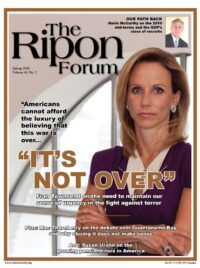
Until recently, few people looked to Massachusetts as a predictor of political trends. It was too blue to be a bellwether. The election of Scott Brown changed that.
Brown’s upset victory this past January to fill the Senate seat held by Edward Kennedy sent shock waves through the political establishment. It also sent a clear signal that people have serious concerns about the level of federal spending in Washington.
And yet Brown’s election may only be the tip of the iceberg when it comes to messages being sent by Massachusetts voters. For if a recent poll by the Beacon Hill Institute is any indication, people are not just concerned with the growth of the federal government under this administration, but they are also increasingly concerned with its direction.
…people are not just concerned with the growth of the federal government under this administration, but they are also increasingly concerned with its direction.
At issue is one of the first Executive Orders made by Barack Obama after he was sworn in as President last year. The Order concerns Project Labor Agreements, or PLAs for short. Under its provisions, the Order encourages federal contractors to follow union work rules and hire all or most of their workers through union halls on any federal project costing $25 million or more.
The Obama Executive Order rescinded an Executive Order made in 2001 by President George W. Bush that prohibited PLAs on federal projects. In reversing this decision made by his predecessor, President Obama argued that large federal projects pose “special challenges” for which PLAs are well-suited.
This argument ignored the fact that the Bush Administration managed to initiate almost $60 billion in large federal projects without PLAs. It also ignored the fact that there was not a single cost overrun or delay throughout the Bush presidency that could be attributed to the absence of a PLA.
Popular with Unions
Unions claim that PLAs guarantee access to skilled labor and avoid “costly delays.” Many believe this claim is nonsense. No contractor needs a union hiring hall to find skilled workers, especially if the skilled workers are part of his own workforce and not members of unions to begin with.
The real purpose of the hiring hall is to put the union in control of the hiring process, not to serve as a recruiting tool. And it’s the union, once a project gets underway, that decides whether or not there will be delays. Nonunion contractors, whose employees represent 85 percent of the construction workforce, are strongly opposed to PLAs ─ and for good reason.
PLAs reduce the competitive advantage of nonunion contractors, who are otherwise not bound by restrictive union work rules when bidding on and performing construction projects.
PLAs reduce the competitive advantage of nonunion contractors, who are otherwise not bound by restrictive union work rules when bidding on and performing construction projects.
Last September, the Department of Labor, in keeping with President Obama’s Executive Order, attempted to place a Project Labor Agreement designation on a new multimillion-dollar Job Corps Center in Manchester, New Hampshire. The fact that only 8.7 percent of the construction workers in New Hampshire were unionized did not deter the Labor Department from this attempt.
The Job Corps Center was the first major PLA test for the Obama Administration. The timing was important. Organized labor stands to gain from the infrastructure projects in the pipeline under the American Recovery and Reinvestment Act. Unions would like to earmark much of that public construction money with PLA designations.
Unfortunately for the President and his union allies, however, the New Hampshire PLA has been put on hold. The Associated Builders and Contractors, a trade group for nonunion construction firms, and one of its members, North Branch Construction of Concord, joined New Hampshire Senator Judd Gregg in complaining that the PLA would be harmful to the majority of local workers. Opponents also pointed to studies by the Beacon Hill Institute showing that PLAs raise construction costs by as much as 20 percent.
In November, almost a month after North Branch filed a protest with the Government Accountability Office, the Labor Department declared that it was cancelling the bidding process for the $35 million project and starting over ─ saying it would consider objections to PLAs.
They won’t have far to look.
The People Object
According to a survey conducted in February by the Suffolk University Political Research Center for the Beacon Hill Institute, 69 percent of Massachusetts voters oppose requiring private contractors to hire workers through union halls. This hiring rule is a key feature of PLAs, and voter disapproval extends by implication to PLAs themselves.
The survey suggests that public opinion of PLAs may be sensitive to perceptions about the degree to which construction workers are unionized. Seventy three percent of the respondents estimated the fraction belonging to unions to be 40 percent or more. In fact, only about 20 percent of private construction workers in Massachusetts belong to unions. Respondents were given this fact before they were asked about hiring through union hiring halls.
According to a survey conducted in February by the Suffolk University Political Research Center for the Beacon Hill Institute, 69 percent of Massachusetts voters oppose requiring private contractors to hire workers through union halls.
The poll, which carries a margin of error of +/- 4.4 percent, captures a nuanced attitude toward organized labor in Massachusetts. The same poll shows that a majority (52 percent) of Massachusetts voters have a favorable opinion of unions. However, the requirement that construction contractors hire their workers through union hiring halls is opposed by almost every segment of the electorate. Eighty eight percent of Republicans, 76 percent of Independents and 52 percent of Democrats oppose the requirement. The poll reveals that even among households with union members, 59 percent are opposed to the hiring provision.
Opposition is consistent across voters segmented according to age, gender, race and attitudes toward candidates for governor. Voters were also asked which candidate they supported in the recent special election for U.S. Senate. Forty-nine percent said they voted for Scott Brown. The same poll found that 61 percent of voters view the newly-elected senator favorably.
It would be ironic if, in protecting its union base, the Obama Administration further jeopardized its standing with the voters as a result of its “encouragement” of PLAs. Under the stimulus bill, the Administration is committing $28 billion to transportation construction projects where PLAs could come into play. Perhaps voters don’t believe that this money should be spent shoring up the union monopoly over federal construction projects.
On the other hand, this Administration has shown its capacity to turn a deaf ear to bellwethers of voter sentiment. It will be interesting to see what the Administration does with the Job Corps Center in New Hampshire, a state in which unions enjoy less popularity than in Massachusetts.
Should it insist on a PLA despite the myriad of objections raised by contractors and political leaders in the state, the Obama administration will once again offer an important clue to its ideological mindset.
David G. Tuerck is Executive Director of the Beacon Hill Institute, and Chairman and Professor of Economics at Suffolk University in Boston.




